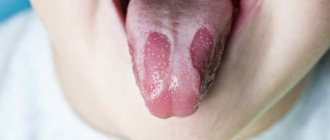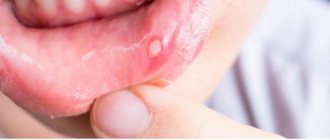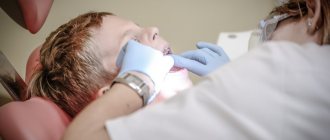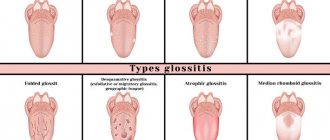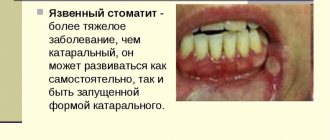The oral cavity is one of the most vulnerable places in the human body. The mucous membrane is a source of proliferation of various pathogenic microorganisms, which can cause the development of certain diseases. Stomatitis is one of the unpleasant infectious diseases of the oral cavity, which has a number of consequences. The disease is characterized by the occurrence and progression of the inflammatory process. If qualified dental care is not provided in a timely manner, there may be a risk of tooth loss, and in some cases, blood poisoning. To avoid such unpleasant complications, when you detect the first signs of stomatitis, you should immediately seek help.
Is stomatitis transmitted through kissing?
Prolonged contact with a sick person can also lead to infection with stomatitis.
Constant exposure of the oral mucosa to foreign pathogenic microorganisms causes a decrease in the immune system and a reduction in the protective mechanisms of the oral cavity itself.
That is why the transmission of stomatitis through kissing is quite common.
Dangerous period
Taking safety measures to combat stomatitis infection requires having certain information. Every adult should know about the duration of the disease and the incubation period.
On average, mucosal lesions are present in the body for 5 to 10 days. This entire period is extremely dangerous for others.
The end of the dangerous period with the possibility of infection is indicated by the complete disappearance of stomatitis symptoms.
But the main stage of the disease is preceded by an incubation period, during which no obvious signs of the presence of the disease in the body are observed. However, the pathogen actively develops in the oral mucosa and is dangerous to others.
The duration of the incubation period depends on the type of stomatitis. On average, the latent stage of the disease lasts from 5 to 7 days, but for some forms this period can be up to 2 weeks. In the case of infants, the incubation period of viral stomatitis is reduced to 3 days.
We suggest you read: Is it possible to remove the smell of beer from your mouth and how to do it quickly? 11 effective recipes
How to protect yourself?
In order to protect yourself from stomatitis, first of all, you must adhere to the rules of hygiene of the gums and teeth.
One of the main protective measures is strengthening the immune system through a healthy diet.
Often stomatitis can be caused by a deficiency of B vitamins, zinc or iron in the body.
A preventive examination by a dentist and timely dental treatment are mandatory.
The bad habit of biting nails, which is very common among children, can cause infection by introducing infectious bacteria from the hands.
If the infection with stomatitis is permanent, then it is necessary that all family members living with the patient be examined by a doctor.
The cause of frequent stomatitis may unexpectedly be someone from your close circle, without even knowing it.
Preventive measures
A very important part of prevention is timely treatment of dental and ENT diseases.
Stomatitis can occur in anyone, regardless of age and lifestyle, but compliance with the following preventive measures can reduce this risk:
- Maintaining oral hygiene and timely treatment of dental diseases.
- Providing a balanced diet to supply the body with the necessary amount of vitamins and nutrients.
- Taking vitamin complexes in spring and autumn.
- Timely treatment of diseases of the ENT organs and digestive system.
- Rejection of bad habits.
Is it possible to get stomatitis through a kiss?
Young people often don’t think about whether stomatitis is transmitted through kissing, and carefreely kiss their other halves. At the same time, they do not take any measures for treatment, considering this disease to be trivial. Is stomatitis so dangerous that you can’t contact other people?
Stomatitis is an inflammation of the oral mucosa, which in most cases is accompanied by the formation of ulcers. Along with this, swelling of the mucous membrane is observed, and a white or yellow-white coating forms. When communicating, a person feels discomfort, and pain occurs while eating. Increased salivation, gums often bleed, and bad breath appears.
Causes of development and risk of transmission
There are quite a few causative factors for the development of stomatitis:
Manifestations of viral stomatitis:
- Pain in affected areas of the oral mucosa.
- Increased body temperature.
- Covering the oral mucosa with small bubbles. They open over time with the formation of painful erosions.
Viral stomatitis is a contagious disease. You can become infected by using:
- Shared cutlery.
- A sick and healthy child in a group has the same toys.
Viral stomatitis can be transmitted through close contact with a sick person through airborne droplets. If a sick person sneezes or coughs, the risk of infection is, of course, higher. But you can catch the disease even during a banal conversation. Read more about viral stomatitis→
If stomatitis occurs due to an enterovirus, then bruising can be seen on the oral mucosa. Additionally, the skin and internal organs are included in the process.
This type of stomatitis can be transmitted by touching hands.
That is why you need to follow all the rules of prevention, which concern not only washing your hands after visiting the street and public places, but also oral hygiene.
Stomatitis in children most often has a bacterial nature. The symptoms of the disease are as follows:
- Loose, swollen and painful soft tissues of the oral cavity.
- Painful cracks and ulcers in the mouth.
- Bad breath.
- Increased body temperature, weakness, dizziness.
How is this form of stomatitis transmitted? There are 2 ways to transmit the pathological process:
- Airborne, i.e. the pathogen is inhaled through the respiratory system.
- Contact, by touching objects that were used by a sick person.
Adults can also become infected with bacterial stomatitis from children. If they share utensils with them, provided that there are injuries in the mouth.
Candidal stomatitis can be diagnosed in both children and adults. It develops when yeast-like fungi begin to actively multiply in the oral cavity, and this happens under the following conditions:
- Long-term antibacterial therapy.
- Weakened immune status.
- High blood sugar.
- Orthopedic structures in the mouth.
- Microdamages and dryness of the oral mucosa.
Clinical picture of candidal stomatitis:
- Swelling and redness of the oral mucosa.
- The appearance of painful ulcers covered with a white, necrotic coating.
A mild form of stomatitis caused by yeast-like fungi is often called catarrhal stomatitis. Patients feel burning and itching of the mucous membrane. The soft tissues of the oral cavity are swollen and hyperemic.
Is candida stomatitis contagious or not? The disease does not spread by airborne droplets. But if a healthy and sick person uses the same cutlery, then the risk of infection is high.
There is also an aphthous form of stomatitis. The reasons for its occurrence lie in:
- Microdamages of the mucous membrane. They develop due to improperly manufactured orthopedic prostheses or inaccuracies in filling. The sharp edges of fillings and dentures can cause chronic injuries that ulcerate over time. Due to the cause of its occurrence, such stomatitis has another name - traumatic.
- Stress factor.
- Insufficient concentration of vitamins in the body.
- Exacerbation of diseases of the gastrointestinal tract.
This form can be diagnosed in both adults and children. The main symptom is plaque-covered ulcers in the mouth. If there are no symptoms of ARVI, which indicate a viral etiology of the disease, then aphthous stomatitis is not transmitted from a sick person to a healthy person.
Infection with stomatitis through kissing
The symptoms of the disease are quite different, as are the pathogens. Despite the seemingly complete study of stomatitis, scientists to this day do not know the exact method of its appearance; one version is inclined to believe that stomatitis is a reaction of the immune system to irritating substances unfamiliar to the body that have entered the oral cavity. As a result, the body sends lymphocytes to fight them, and so ulcers are obtained, which clearly indicate the presence of the disease.
In addition, a fungal infection in the mouth can also play the role of a pathogen. In such a situation, kissing is also best avoided.
If we are talking about herpes, it is very easy to catch it by using the patient’s dishes, so during the period of illness it is strongly recommended to maintain personal hygiene and scald the dishes with boiling water. Upon completion of treatment, you should change your toothbrush.
There is an excellent remedy against the herpes (aphthous) form of the disease. The use of acyclovir for stomatitis helps get rid of inflammation and pain.
Emergency measures
If you suspect the presence of stomatitis in the house, emergency preventive measures must be taken. Both folk remedies and medications can resist infection. The following solutions can be used to rinse the mouth:
- aloe juice diluted with water in a 1:1 ratio;
- decoction of chamomile, oak bark, calendula, sage;
- carrot or cabbage juice diluted in a 1:1 ratio;
- a solution of propolis tincture, which is added to a glass of boiled water in the amount of 10 drops.
As a preventive measure, as well as to stop the development of the disease, you can resort to pharmaceuticals:
- eucalyptus in the form of lozenges;
- Lugol's solution for treating the oral mucosa;
- rotokan – homeopathic medicine;
- Cholisan gel, etc.
What if stomatitis cannot infect a partner?
There are situations when kissing does not transmit stomatitis to a partner - for example, if the cause of stomatitis is a gastrointestinal disease, poor personal hygiene, or poor-quality fitting of dentures. But even in this case, it is better to refrain from kissing. After all, the altered microflora of the mouth during stomatitis creates a bad odor from the oral cavity, which is unlikely to please your partner . To eliminate the bad odor, you can use Metrogyl Denta. Plus, Metrogyl Denta helps with stomatitis.
You should first undergo a course of treatment, and then you can move on to kissing. As a rule, the illness does not last longer than 10 days if patients adhere to good personal hygiene and take medications responsibly for topical or internal use.
Viral
The herpetic form of the disease is the most contagious. How many days should you be “afraid” of stomatitis: the easiest way to “catch” the infection is in the first 2–5 days after it “makes itself known” in the mouth of a sick person. In the next 5–10 days, herpetic stomatitis is less contagious, but the threat nevertheless remains.
We invite you to check out SOS!!! Bridge or implant???
The viral infection is transmitted:
- in close contact with an infected person (for example, by kissing);
- through personal belongings (by everyday means);
- airborne, oral-fecal route.
Inflammation is manifested by the formation of swelling, ulceration, wounds, hyperemia in places where pathogenic microflora accumulate
Viral stomatitis is transmitted from child to child after the child touches sores (vesicles) with his fingers, and then touches toys, etc. The following population groups are most at risk of infection with the herpetic form of the disease:
Staphylococcal stomatitis
- children of primary preschool age (due to immature immunity);
- stomatitis in adults is a consequence of a malfunction of the body’s defenses;
- patients with a tendency to chronic hyperglycemia;
- those who have undergone long-term drug treatment.
Can stomatitis be transmitted by kissing?
Stomatitis is diverse in origin and symptoms. Oddly enough, despite the fact that the disease has been thoroughly studied, experts still do not know exactly the mechanism of its occurrence. The most common version is that stomatitis occurs as a response of the human immune system to unfamiliar irritant substances found in the oral cavity. As a result of the “attack” of lymphocytes of the immune system on the molecules of these substances, numerous small ulcers arise - the main symptom of stomatitis.
Such substances can be pathogenic microorganisms transmitted by airborne droplets, for example, the herpes virus or staphylococci. In this case, if a person with stomatitis wants to kiss his partner, he will almost certainly “give” him these pathogenic viruses or bacteria. Therefore, it is better not to take risks and refrain from kissing until complete recovery. Never kiss young children when they are sick, because their immune system cannot resist some viruses and bacteria that can be passed on to them. Stomatitis can also be caused by fungi that have entered the oral cavity. In this case, kissing is also undesirable, because you can transmit these fungi to your partner.
If stomatitis is herpetic, it can even be transmitted through dishes. Therefore, during illness, use personal cutlery and rinse it with boiling water. After recovery, be sure to change your toothbrush.
Popular questions
The following are popular questions about stomatitis that people often ask specialists:
- When kissing, there is a risk of contracting some forms of stomatitis.
Is stomatitis contagious from kissing? There is a risk of infection with a fungal, viral or bacterial form through saliva; especially if there are wounds in the mouth.
- Is it transmitted by airborne droplets? The viral, less often bacterial, form of the disease is transmitted by airborne droplets.
- Is it possible to get infected from a child? A healthy adult can rarely become infected with stomatitis from a child; the risk increases if you have diabetes in an adult or tonsillitis in a child.
- How many days is stomatitis contagious? In most cases - 8 days.
- Is this an infectious disease? Stomatitis has a complex classification, which also includes infectious forms.
- Is it possible to die from stomatitis? Stomatitis is not a fatal disease, but the lack of treatment can lead to intoxication of the body, damage to internal organs, the transition of some pathologies to a chronic form and other complications.
When the first symptoms of stomatitis appear, it is recommended to consult a specialist for diagnosis and confirmation of the diagnosis. Timely adoption of measures contributes to rapid recovery without complications; during therapy, it is necessary to remember safety measures so as not to infect other people.
Why you shouldn't kiss, even if stomatitis is not contagious
There are a number of cases when kissing with stomatitis cannot lead to infection of the partner. For example, if this disease is caused by problems in the gastrointestinal tract or arose as a result of poor oral hygiene, as well as insufficiently accurate selection of dentures. But even then, kissing is still undesirable.
The thing is that due to disturbances in the microflora in the oral cavity and inflammatory processes, stomatitis is often accompanied by the appearance of bad breath. Therefore, when you kiss, you can give your partner not pleasure, but very uncomfortable sensations. It’s better to get cured first, and then kiss your loved one for good health. Stomatitis often goes away within 10 days if you maintain good oral hygiene, take medications, or use medicated ointments.
Aphthous and traumatic: is it contagious or not?
These types of stomatitis are safe for others and are not contagious.
Aphthous appears against the background of diseases of the gastrointestinal tract, stress, and lack of vitamins. Traumatic occurs when mucous tissue is damaged, careless brushing of teeth, or scratches. These species do not have fungal, bacterial or viral pathogens.
The disease is not transmitted to others.
Important! These types of illness last 5-10 days and are characterized by small ulcers and wounds that heal quickly. Weakness and elevated body temperature do not occur. The patient tolerates the disease easily.
Take breaks
Mastering the technique is quite simple - spend time on theory and preparation for the process itself. Before you kiss your partner, move closer to him and freeze at the very last moment for a while, as if in indecision. Waiting for a kiss, especially when it is so close and desired, can cause a lot of vivid and unforgettable experiences.
Another secret is breaks between kisses. Of course, if you are overwhelmed by passion, sometimes there is simply no point in stopping. But at the initial stage of a relationship or if you want to add variety and experiment to your life, kissing can be combined with moments of relaxation. During breaks, look into your partner's eyes, stroke their face, hair or neck, or simply touch each other's lips or noses. Believe me, these sensations can become as pleasant and sensual as the kiss itself. In addition, gentle, open glances speak much more than a thousand words about your feelings.
Vary your technique
Some people kiss in one way for many years, without even thinking about how pleasing their actions may be to their partner. Finding out is not so difficult - watch the reaction. If you see that your partner is literally thrilled by your caresses, moaning and responding to the kiss with readiness and passion, you are on the right track. If you notice that the gestures are purely mechanical, and you don’t linger particularly long during the kiss, perhaps this is a signal that you should slightly change your tactics.
The main rule in any kiss is to listen to your partner and try to guess which touches give him the most pleasure. Try lightly touching the lower lip of the object of your passion and using gentle, light movements, lightly massage it with your lips. Or, gently move your partner’s upper lip with your teeth and, as if playing, bite it. Such a gesture has a very strong stimulating effect.
Description of the disease
Viral stomatitis is an infectious disease that affects the soft tissues of the oral cavity.
As a rule, it is characterized by severe inflammation, swelling and dermatological manifestations. The rashes are often localized on the lips and palate, and in advanced cases, characteristic symptoms develop on the tongue, mucous membranes of the cheeks and throat. Viral stomatitis can become chronic with seasonal remissions and relapses.
In 80% of all cases, the cause of the disease is chronic or acute herpes; in addition, infection occurs against the background of influenza, measles or chickenpox. If you have a strong immune system, the disease can go away on its own in just a few days, but more often it occurs with severe symptoms.
Is it allowed to kiss with stomatitis?
The nature and manifestations of the pathology are diverse, and, despite the fact that the disease has been sufficiently well studied, experts cannot accurately determine the mechanism of its formation. According to one version, the disease begins due to the response of the immune system to unknown irritants that have penetrated the oral cavity.
Various microorganisms moving through the air (for example, herpes virus or staphylococcus) can act as such irritants. In this case, when kissing a person who has stomatitis, the partner is almost guaranteed to receive pathogenic viruses or bacteria. To prevent unnecessary risk, it is better not to kiss until you have fully recovered.
During the development of the disease, it is absolutely forbidden to kiss young children, since their immune system has not yet developed ways to fight certain infectious agents. Stomatitis can also be caused by fungi that have settled in the oral cavity, so in such cases it is also worth temporarily limiting kissing so as not to transmit pathogens to your partner.
Prevention of occurrence
To protect yourself as much as possible from the occurrence of this disease, you should adhere to the following preventive measures:
- Carefully monitor your oral health and promptly treat diseases of your teeth and gums. Avoid injuring the oral mucosa with overly hard brushes. Avoid toothpastes and mouthwashes containing sodium lauryl sulfate.
- Eliminate from the diet dishes and products that can irritate the mucous membrane and can lead to injury.
- Carefully observe personal hygiene, wash your hands after coming from outside.
- Use vitamin complexes to prevent the development of vitamin deficiency.
- Wash vegetables and fruits thoroughly before eating.
- When in contact with sick people, take precautions and use medical masks.
- Treat any inflammatory diseases in a timely manner to avoid a significant decrease in immunity.


